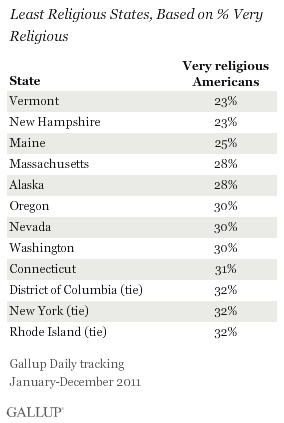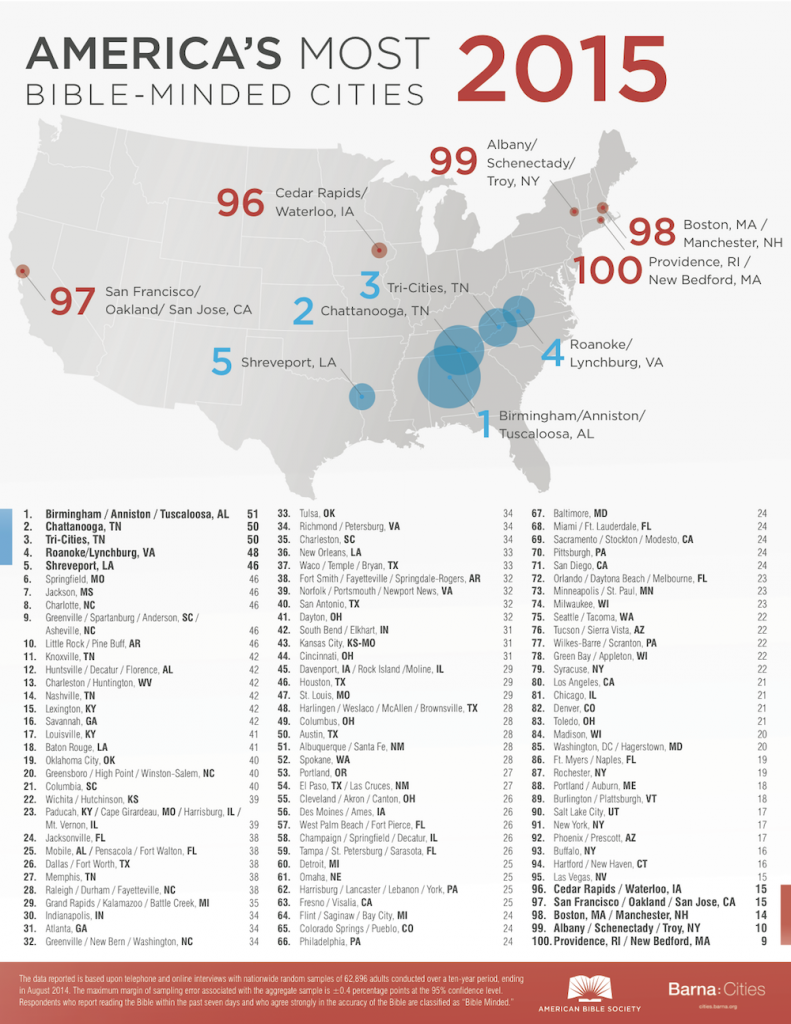The weekly report on research and demographics of the secular movement
by Julie Esris
A recent study reveals that the Seattle metropolitan area has the highest rate of atheists in the United States. In fact, only an estimated 3% of Americans are atheist, but in the Seattle metropolitan area, the rate is a whopping 10%. 37% of those in the Seattle metro area are religiously unaffiliated, compared to the 23% national average. Seattle is comprised of 16% atheists and agnostics versus 7.1% nationally. Meanwhile, 52% of Seattleites identify as Christian; the national average is 70.6% The article which presented this study quotes James Wellman, the comparative religion studies chair at the University of Washington, as saying, ÔÇ£When people come to the Northwest, they come across the Cascades and all their old affiliations just drop out the door.ÔÇØ
While WellmanÔÇÖs explanation seems to be a little simplistic, he may have a pointÔÇönot just about Seattle, but about costal areas in general. In fact, a 2012 Gallup poll reveals that the majority of the least religious statesÔÇöranging from 23%-32% religiousÔÇöare those along the coasts. With the exception of Alaska and Nevada, all of the twelve comparatively non-religious states are those in the Northeast and the Pacific Northwest. Vermont is ranked as the least religious state, at only 23%. Rhode Island, Washington, D.C., and New York tie at the bottom of this list of comparatively-secular states at 32%. On the other end of the spectrum, the ten most religious states are overwhelmingly those in the Deep South, with Mississippi topping the list at 59% religious.

Another survey that examined individual cities reveals a pattern that correlates with the Gallup poll. Released in 2015, the study presents a list of 100 major cities, with the most religious at the top and the least religious at the bottom. Not surprisingly, the twenty cities at the bottom of the list include Los Angeles, California; Madison, Wisconsin; Chicago, Illinois; Washington, D.C.; New York, New York; Las Vegas, Nevada; San Francisco, California; Boston, Massachusetts; and Providence, Rhode Island. San Francisco (15%), Boston (14%), and Providence (9%), fall within the bottom five least religious American cities. It is important to note that this study ranks Seattle as the 75th most religious, rather than at the bottom of the list. One must bear in mind that this study measured religiosity. The study that examined Seattle presented it as the city with the highest percentage of atheists specifically.
These statistics, again, indicate that the least religious cities and states are primarily those along the coasts. But why? And why is Vermont the least religious state? The answers to these questions are probably somewhat complicated, but it is worth speculating some possible reasons. First of all, cities have historically been formed near large bodies of water to facilitate transport of goods, which, naturally, would mean that many cities would have formed along the coasts. Major cities such as New York, Seattle, Boston, and San Francisco are host to diverse communities, to people from a variety of religious backgrounds. This means that these citiesÔÇÖ inhabitants are probably more likely to be exposed to a larger variety of ideas and viewpoints. For example, religious person who migrates to a major city like Seattle might begin to question his faith when he meets those of other religions or atheists. It could make him realize that there are more religions than just the one to which he adheres and not all of themÔÇöor maybe even none of themÔÇöcan be right.
Another possibility is that there is simply more to do on a Sunday in a major metropolitan area, whereas in a more remote, rural area church may be one of only a few diversions on a SundayÔÇöor any day of the week.
But why is Vermont ranked the least religious state? It does not boast a major metropolis like New York, San Francisco, Boston, or Seattle, although it does have Burlington, which ranks #89 in religiosity among the cities surveyed. Still, it is counterintuitive that Washington, New York, or California wouldnÔÇÖt top the list as the least religious states, but this could be because these aforementioned states are much larger in terms of land area possibly have more areas that are sparsely populated. Additionally, Vermont is in the Northeast, home of several metropolitan areas in relative close proximity to each otherÔÇöBoston, New York, Portland (Maine), Philadelphia, and Washington, D.C.ÔÇöwith Boston and Portland only a couple hoursÔÇÖ drive away.
There is no definitive answer as to why SeattleÔÇöand other major metropolitan areasÔÇöare among the least religious parts of America, but it is worthwhile to think of these areas in the way many secularists have come to think of the Internet: a diverse meeting place for an exchange of ideas. Like the Internet, cities could be where religion goes to die.

